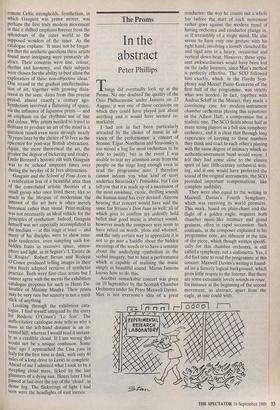The Proms
In the abstract
Peter Phillips
Things did eventually look up at the Proms. No one doubted the quality of the Oslo Philharmonic under Jansons on 23 August: it was one of those occasions on which they could have played just about anything and it would have seemed re- markable.
I had not in fact been particularly attracted by the choice of music in ad- vance of the performance: a concert of Strauss, Elgar, Nordheim and Stravinsky is too mixed a bag for most orchestras to be able to justify; but in the event I was unable to tear my attention away from the people on the stage long enough even to read the programme note. I therefore cannot inform you what kind of story underlies Stravinsky's Petrushka, but I can tell you that it is made up of a succession of the most ravishing, exotic, thrilling sounds the human mind has ever devised. Anyone hearing that concert would have said the same for Strauss's Don Juan as well; all of which goes to confirm my ardently held belief that good music is abstract sound, however much the composer may seem to have relied on words, plots and whatnot, and the only certain way to appreciate it is not to go into a huddle about the hidden meanings of the words or to have a seminar about the underlying symbolism in the verbal imagery, but to hear a performance which is capable of realising the music simply as beautiful sound. Mariss Jansons knows how to do this.
Another remarkable concert was given on 10 September by the Scottish Chamber Orchestra under Sir Peter Maxwell Davies. Max is not everyone's idea of a great
conductor: the way he counts out a whole bar before the start of each movement rather goes against the modern trend of having orchestra and conductor plunge in, as if irresistibly of a single mind. He also seems to have only one gesture with his right hand, involving a loosely clenched fist and rigid arm in a heavy, occasional and vertical down-beat. However, these appa- rent awkwardnesses would have been lost on the radio listeners, since Max's method is perfectly effective. The SCO followed him exactly, which, in the Haydn Sym- phony and Mozart Piano Concerto of the first half of the programme, was strictly what was needed, In fact, together with Andras Schiff in the Mozart, they made a convincing case for modern-instrument chamber orchestras playing this repertoire in the Albert Hall: a compromise but a realistic one. The SCO fields about half as many string players as a full-size symphony orchestra, and it is clear that through long experience of keeping to these numbers they think and react to each other's playing with the same degree of intimacy which an authentic-instrument band would enjoy. I felt they had come close to the elusive spirit of late 18th-century orchestral writ- ing, and if one would have preferred the sound of the original instruments, the SCO provided important compensations, like complete audibility.
They were also equal to the writing in Maxwell Davies's Fourth Symphony, which was receiving its world premiere. This work, based on plain-chant and the flight of a golden eagle, requires both chamber music-like intimacy and grand gestures, often in rapid succession. Such contrasts, as the composer explained in his programme note, are inherent in the title of the piece, which though written specifi- cally for this chamber orchestra, is still called a symphony, not a sinfonietta. Yes, I did find time to read the programme at this concert: Maxwell Davies's writing is found- ed on a fiercely logical background, which gives little respite to the listener. But there are some extremely lovely sounds en route, for instance at the beginning of the second movement, as abstract, apart from the eagle, as one could wish.


































































 Previous page
Previous page